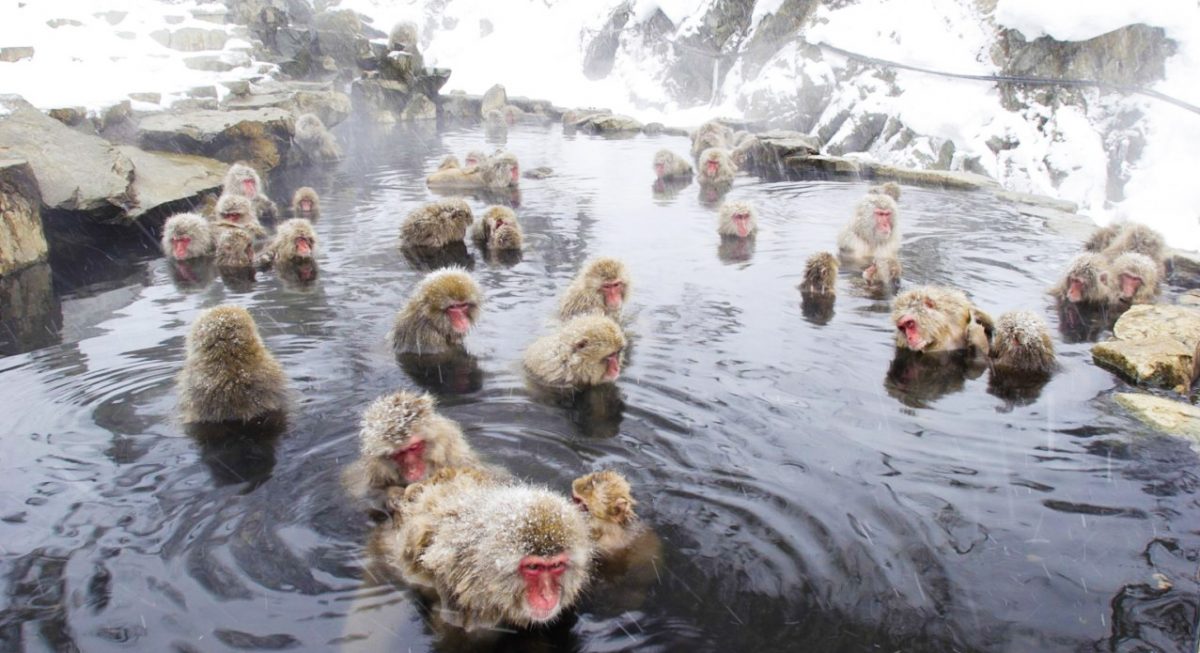Jigokudani macaque park in Nagano, Japan

In the Jigokudani valley, about 850 meters above sea level, we find one of the best-known groups of macaques worldwide: Jigokudani macaques, also known as Yokoyu river macaques or snow monkey.
If we are in Nagano, in addition to visiting the city and especially the Zenkoji temple, surely we also have in mind to make a getaway to see the Jigokudani macaques.
Another wonderful place to visit somewhere in Asia is Mount Fuji, especially Gora Park, the largest rock park in all of Asia. In it you can find a giant pond and also several gardens, such as the garden of alpine plants and the tropical botanical garden and even a natural history museum.
And although in the photos we almost always see them soaked in hot springs and surrounded by snow in winter, the truth is that it is an interesting visit at any time of the year.
Park history
The Jigokudani Macaque Park was inaugurated in 1964 and since then it has attracted the attention of both photographers, in search of the perfect photo, and of researchers in ecology and biology.
But it was undoubtedly during the Nagano Winter Olympics (1998) and especially thanks to an article in The New York Times when, they say, the park became popular among foreign tourists.
By its nature, the area received the name of hell valley or Jigokudani. And it is here that about 200 macaques live that, in winter, survive the low temperatures and the thick blanket of snow that covers the region thanks to the natural thermal waters that flow through the mountains.
¿What is allowed and not allowed to do?
Do not interact with the macaques or approach them thinking they are your ‘colleagues’.
Do not stare into their eyes (for them, it is a hostile act).
Don’t show them anything to eat and naturally don’t feed them.
Don’t talk to them (they don’t understand you and they could see in your movements a hostile approach).
Keep a safe distance.
¿What can we learn from macaques?
Japanese macaques are the only primate, with the exception of man, who lives so far north. That is why in english they are called snow monkey or snow macaque, because there is no other group of macaques that live in regions where there is snow.
The pregnancy lasts 180 days and the females of Jigokudani give birth between April and June, so if you visit the park at that time you will see many newborns.
Males usually change herds several times throughout their lives, while females remain in the same group throughout their lives.
Macaques do not build cabins or nests in which to sleep, but instead change places according to the day. Of course, usually sleep swirling and next to rocks, trees or cliffs.
Macaques eat tree buds, new leaves, flowers, fruits, nuts and seeds (autumn) and insects and worms (summer).
Yumichi traditional route
This is the traditional path to the park. It consists of a beautiful walk of 1.6 kilometers with little slope and suitable for all ages, it takes about 30-40 minutes.
To get there, you have to take a bus from Yudanaka station and get off at Kanbayashi Onsen or Kanbayashi Onsen-guchi and from there start the path, perfectly marked.
The alternative route from the parking lot
This alternative route involves walking less, since the idea is to reach the parking lot closest to the park and from there walk about 10-15 minutes.
There are two problems with this alternative route:
First, there is no public transportation to the parking lot, so we would have to go in our car or pay for a taxi.
And secondly, the narrow road closes during the winter months, at which time only the traditional Yumichi route is accessible.
The Snow Monkey 1-Day Pass
Without a doubt, the best way to get to and move around this area is with a tourist pass called Snow Monkey 1-Day Pass.
¿Why do we recommend the Snow Monkey 1-Day Pass to get to Jigokudani?
The pass, this good at first, can be expensive, but it is profitable because it includes all the necessary routes to get to the park and the entrance to it.





